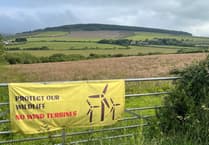Actions outlined in the airport masterplan would cost £120m over 10 years, Tynwald has been told.
The draft masterplan outlines future development proposals including improvements needed to airside, landside and terminal facilities.
These include enhancement of runways and taxiways, passenger processing and security, access, car parking and car rental facilities.
Replaying to a Tynwald question from former DoI Minister Chris Thomas, his successor Tim Crookall said the draft masterplan is currently being worked on and is expected to be presented to Tynwald in the final quarter of this year.
The masterplan has never been published but a summary was included in an ‘Airport: Function, Future and Form’ document published in April last year.
Mr Crookall said the cost of remedial and strategic actions as outlined in that report were ‘circa £120m over the next 10 years, but work is ongoing to validate these requirements and costs.’
He said of the projects listed, the airfield drainage project has been progressed to design phase.
Improvements planned for the terminal building for next year include a new bar and Costa Coffee in the departure lounge with new seating as well as more coffee machines and tills to speed up service. The downstairs holding area will also be extended.
The draft masterplan refers to the need for a contingency airfield at Jurby. In a dramatic u-turn last month, government ditched plans to zone Jurby airfield as a future replacement for Ronaldsway as the island’s national airport.
Treasury Minister Dr Alex Allinson, in response to a separate question from Mr Thomas, revealed that more than £7.5m has been spent on subsidising air routes since the 2021 general election.
The subvention paid to airlines has risen from £2.1m in 2022-23 to £4.1m the following year, and the figure so far this year is £1,325,361.
Dr Allinson said the subvention has ensured stability.
Enterprise Minster Tim Johnston told the Government Conference lasr week that recognising ‘some volatility’ in regional routes, a strategy to support core air routes through long-term intervention will go to Tynwald this year.
Meanwhile, the number of air traffic controllers at Ronaldsway has reduced by one since April - but the number who are fully qualified and available for duty has increased by one.
The Infrastructure Minister outlined details of ATC staffing in a written response to a Tynwald question from Douglas South MHK Claire Christian who asked for an update on the position since April and inquired when runway closures due to air traffic control issues will end.
Mr Crookall replied that in April there were a total of 17 ATCOs including those in training but this number had fallen to 16 by the beginning of September. However, the number who are fully qualified and available for operational duty had increased from nine to 10.
He said it was important to note that while a target of 18 ATCOs would provide a fully resilient roster, it was not the number required to remove the current runway closures.
The DoI Minister said two experienced ATCOs joined the unit in May and September this year but one had subsequently left. The other has completed training and became fully qualified in July.
He said three new student ATCOs have joined the airport since August last year and one student ATCO who joined in April 2021 is on track to becoming fully qualified by the end of 2025.
Mr Crookall said it had been hoped that runway closures could be lifted by the summer of this year but the loss of further staff had prevented this.



.png?width=209&height=140&crop=209:145,smart&quality=75)
-(1).jpeg?width=209&height=140&crop=209:145,smart&quality=75)